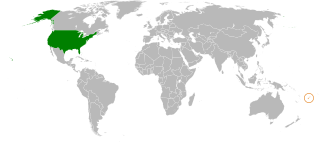
Ambassadors of the United States are persons nominated by the president to serve as the country's diplomatic representatives to foreign nations, international organizations, and as ambassadors-at-large. Under Article II, Section 2 of the U.S. Constitution, their appointment must be confirmed by the United States Senate; while an ambassador may be appointed during a recess, they can serve only until the end of the next session of Congress, unless subsequently confirmed.

Nauru, following independence from the United Kingdom, became a sovereign, independent republic on 31 January 1968. Nauru has established diplomatic relations with a number of nations, including most of its Pacific neighbors with which it maintains economic, cultural and administrative ties.
From 1916 to 1975, Tuvalu was part of the Gilbert and Ellice Islands colony of the United Kingdom. A referendum was held in 1974 to determine whether the Gilbert Islands and Ellice Islands should each have their own administration. As a consequence of the referendum, the separate British colonies of Kiribati and Tuvalu were formed. Tuvalu became fully independent as a sovereign state within the Commonwealth on 1 October 1978. On 5 September 2000, Tuvalu became the 189th member of the United Nations.

Oceania is, to the People's Republic of China and the Republic of China, a stage for continuous diplomatic competition. The PRC dictates that no state can have diplomatic relations with both the PRC and the ROC. As of 2019, ten states in Oceania have diplomatic relations with the PRC, and four have diplomatic relations with the ROC. These numbers fluctuate as Pacific Island nations re-evaluate their foreign policies, and occasionally shift diplomatic recognition between Beijing and Taipei. The issue of which "Chinese" government to recognize has become a central theme in the elections of numerous Pacific Island nations, and has led to several votes of no-confidence.

Fiji–United States relations are the bilateral relations between the Fiji and the United States. The relationship has improved significantly since Fiji's elections in September 2014, which restored a democratically elected government to Fiji for the first time since 2006. The United States had opposed Fiji's unelected government, which came to power through a military coup in December 2006.

Kiribati and the United States have diplomatic relations. Geographically, Kiribati is the closest neighboring country to the state of Hawaii.

Fiji and South Korea established official diplomatic relations in January 1971, Korea having recognised Fiji's accession to independence the previous year. There is a South Korean embassy in Suva and a Fijian embassy in Seoul. Fiji opened its embassy in Seoul in July 2012 to "foster trade and investment" and to "promote people-to-people exchanges".
Cuban-Pacific relations are diplomatic, economic, cultural, and other relations between the Cuba and countries situated in Oceania. In the 2000s, Cuba has been strengthening its relations with Pacific nations, which have, for the most part, responded favorably to Cuban medical aid in particular. The first Cuba-Pacific Islands ministerial meeting was held in September 2008 in Havana, with government members from ten Pacific countries—Kiribati, Tuvalu, Nauru, Solomon Islands, Fiji, Tonga, Vanuatu, Samoa, the Federated States of Micronesia and Papua New Guinea—attending. The meeting was a consolidation rather than a starting point of Cuban-Pacific relations.

Clarence Steven McGann was an American diplomat who served as the United States Ambassador to Fiji, Kiribati, Nauru, Tonga, and Tuvalu from 2008 to 2011. He was nominated by President George W. Bush, and assumed his duties at post in October 2008.

This is a summary history of diplomatic relations of the United States listed by country. The history of diplomatic relations of the United States began with the appointment of Benjamin Franklin as U.S. Minister to France in 1778, even before the U.S. had won its independence from Great Britain in 1783.
The Embassy of Switzerland in New Zealand is the official representation of Switzerland in New Zealand and in a number of Pacific island countries.

Nauru-United States relations are the bilateral relations of Nauru and the United States The U.S. has no consular or diplomatic offices in Nauru. Officers of the American Embassy in Suva, Fiji, are concurrently accredited to Nauru and make periodic visits.

Marie C. Damour is an American diplomat who is the current Ambassador to Fiji, serving concurrently as the ambassador to Kiribati, Nauru, Tonga, and Tuvalu. She previously served as Consul General of the U.S. Consulate General in Ho Chi Minh City, Vietnam.
The Embassy of the United States in Apia is the diplomatic mission of the United States of America in Samoa.











